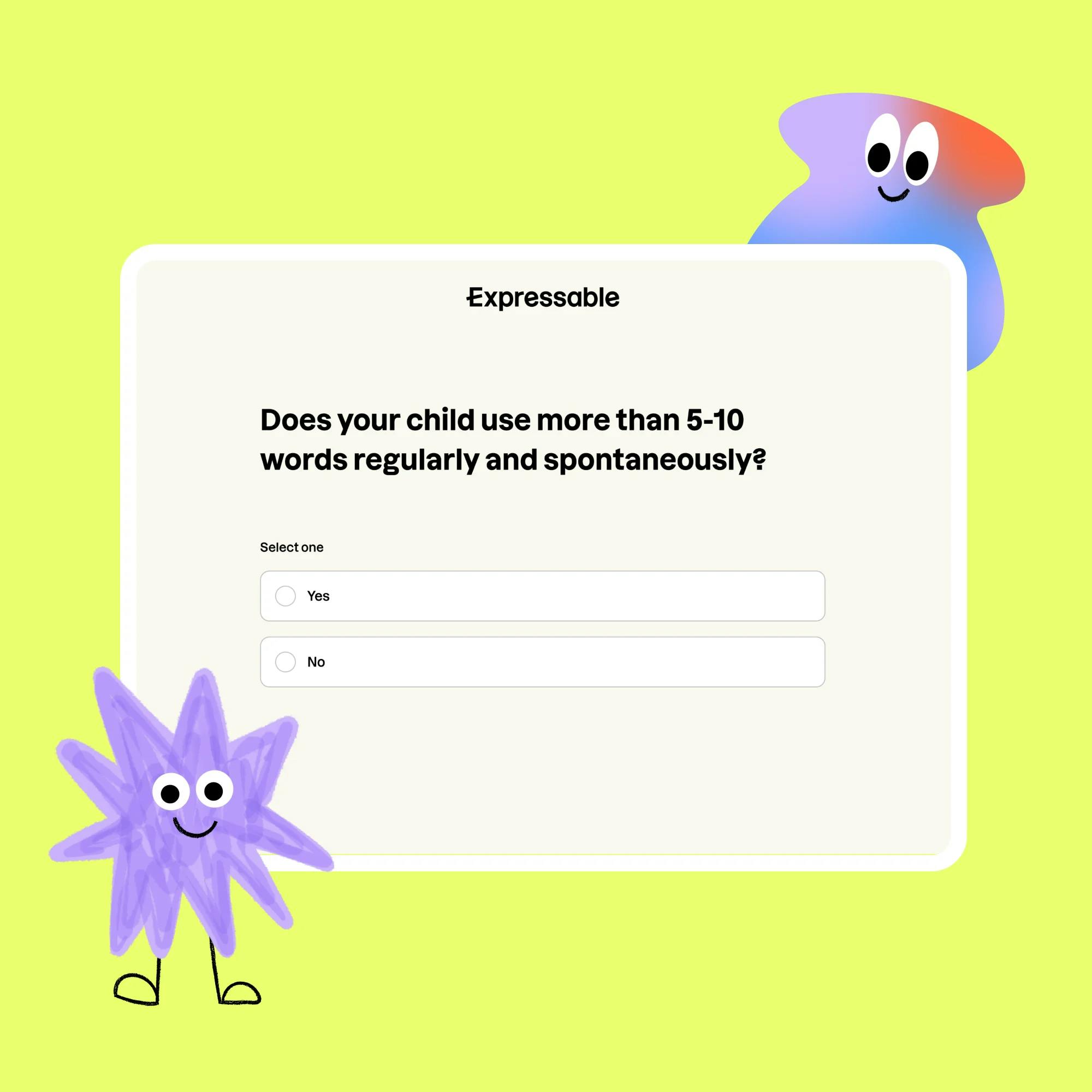Parents of preemies are often concerned about their babies’ health. Being premature does put infants at higher risk of health or developmental complications, including speech and language delays. While it’s hard to say why some children develop a communication delay and others don’t, there are risk factors to be aware of. Learn the signs of a speech delay and what to do if you suspect your premature child is delayed.
Concerned about your child's speech?
We're here for you. Get matched with a speech therapist who's experienced in your child's area of need and available when you are.
 Find a speech therapist
Find a speech therapistParents and caregivers often have lots of questions about their preemie’s development in the first year and beyond. Here’s how a speech therapist would answer these common questions about speech delay in premature babies.
Q: How likely is it that my preemie will have a communication delay?
A: While we can never predict which kids will have difficulty with language, there are some risk factors that make a premature baby more likely to have a communication delay:
Needing respiratory support, especially for an extended amount of time
Having a hearing loss
Having a tracheostomy
Has many other health problems related to prematurity
Having had bronchopulmonary dysplasia (BPD)
Researchers are looking at ways to prevent these delays. One study from 2025 revealed that greater exposure to their mother’s voice promotes a premature baby's early language-related brain development. This means that hearing mom's voice more often might reduce language delays among preemies.

Q. How can I tell if my premature baby has a speech delay?
A: There is so much language development that happens in a baby’s first year. While most infants don’t begin to say true words until around age 1, there are many other communication skills that need to develop before this point. These skills can offer a clue as to whether your child is on track. But if you don’t know the signs to look for, it may be a little tricky to spot a possible speech or language delay.
It helps to know the speech and language milestones for ages 0-12 months, 12-23 months, and 24-36 months. Research has shown that much of the connection between prematurity and speech and language delays decreases by around 36 months of age.
Q: What are the signs of a possible speech or language delay in a premature baby?
A: As mentioned above, it helps to understand the skills that babies and toddlers are expected to acquire in their first few years. But when you compare your child’s current skills to expectations for their age group, make sure you’re going by their corrected age, also called adjusted age.
Here’s how to find your premature baby’s corrected age: Take your child's age, and subtract from it the number of weeks that they were premature.
Say your baby is 12 weeks old, but they were born 4 weeks before their due date. 12 weeks - 4 weeks = 8 weeks. That makes your baby’s adjusted age 8 weeks old. So, when looking at milestones, you should look at the list for 2-month-olds as opposed to 3-month-olds.
When you compare your child’s skills to expectations for their age group, make sure you’re going by their corrected age.
Here’s another example. You may wonder when your preemie should start talking. Children usually say their first word around 12 months old. So, a preemie born 4 weeks before their due date may not start talking until around 16 months old.
Most doctors recommend adjusting your child’s age until they’re about 2 years old. But be sure to talk with your child’s pediatrician to get their specific recommendation.
Now that you know how to find your child’s corrected age, let’s review some major communication milestones that should occur during the first and second year:
Milestones for 0-3 months:
Responding to sound by startling or reacting to loud sounds (could be a sign of hearing loss if baby does not respond to sound)
Cooing
Smiling


Milestones for 3-6 months:
Shifting eyes and turning head toward sound
Experimenting with their voice
Simple babbling like “ma!”
Laughing
Milestones for 6-9 months:
Reacting to simple games like “peek-a-boo”
Waving
Longer strings of babbling: “babababa”


Milestones for 9-12 months:
Displaying joint attention
Responding to very simple directions like, “Come here” or “Stop”
Imitating sounds after you
Saying first words around 12 months
Milestones for 12-18 months:
Responding to their name
Following simple directions such as, “Give me the ball”
Lengthening attention during play routines
Speaking more spontaneously
Milestones for 18-24 months:
Should be able to understand around 50 words
Saying early consonants like /p/, /b/, /m/, /n/, /d/
Playing with toys appropriately (such as using a toy bottle to feed a baby doll)
Making eye contact consistently
Saying at least 5 to 10 words frequently
Beginning to use 2-word phrases, like “Want milk”

Q: How do I know if my premature baby needs speech therapy?
A: All children develop at different rates, whether they were born premature or full-term. If you notice that your child isn’t demonstrating some of the skills expected at their corrected age, talk to their pediatrician. Your premature baby or toddler may need a speech evaluation.
You can take our simple online screener to find out if your child would benefit from an evaluation. The questions are tailored by age, and you'll receive personalized results in minutes. Your doctor may recommend waiting a bit longer to watch your child’s development. But please note that it’s important to trust your gut. These first years of development are crucial, and it’s better not to waste time when your child could be receiving help. If your pediatrician recommends a “wait and see” approach, don’t wait more than a month before contacting a speech therapist.
If you have concerns, you could go ahead and make an appointment with a speech therapist now. Many speech therapy providers have long waitlists, so it makes sense to get on the list! If your child makes progress, you can always take your name off.


Q: How do I find a speech therapist for my premature child?
A: First, you will likely need a referral from your pediatrician. Ask if there are speech therapists they recommend. You can also talk with family and friends whose children have had speech therapy. Researching online is another option. Be sure to pay attention to online reviews.
If you have health insurance and want to use it for speech therapy, you’ll need to see a speech therapist that’s in-network with your insurance company. Learn more in our guide to insurance coverage for speech therapy.
You can click here to get matched with a speech therapist at Expressable. Find a therapist with experience working with children who were born premature. We accept many large health insurance plans, and there are no waitlists.
Once you find a speech therapist, you’ll make an appointment for a speech-language evaluation. In this evaluation, the speech therapist will assess your child’s current communication skills and determine if therapy is needed. If it is, the speech therapist will create a treatment plan of goals that target areas where your child needs to improve.
Throughout speech therapy, you’ll work closely with your child’s speech therapist. They will keep you updated on your child’s progress and teach you what to practice at home. Practicing between sessions is vital to children’s progress!


Early intervention make a difference
If your baby or toddler is behind in their communication development, do your best not to worry. Easier said than done, right? But try to stay positive! There are so many benefits to spotting a speech and language delay early. You can start helping your child sooner, which will help them get caught up more quickly.
Every child’s communication journey is different. Some children may catch up within months, while others take more time. Some children may even use different modes of communication, such as sign language or AAC. No matter what their journey looks like, your involvement makes a world of difference. No one is better at knowing what your child needs than you are! Be proud of all that you’re doing for your little one, and get ready to watch their communication skills soar.
How Expressable Can Help
Concerned your child isn't reaching age-expected milestones? Looking for communication support from a professional? Expressable is a national online speech therapy practice serving children and adults. We treat all major areas of communication and feeding, offer flexible hours including evenings and weekends, and accept most major health insurance plans. We’re proud to have earned more than 3,000 5-star reviews from our clients (4.9/5 average).
Our therapy model is centered on parent and caregiver involvement. Research proves that empowering caregivers to participate in their loved one’s therapy leads to better outcomes. That’s why we combine live, 1-on-1 speech therapy with personalized education and home practice activities for faster progress.
Communication is more than words. It’s how we share how we feel and show who we are. We’re here to help you or your child do just that.

 Abby Barnes, M.S., CCC-SLP
Abby Barnes, M.S., CCC-SLP











